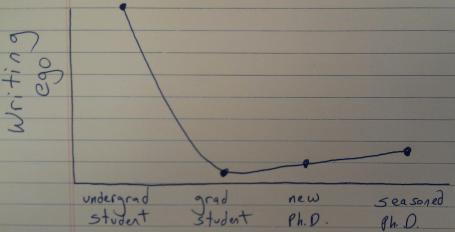Constructive Criticism Part II: Taking It
Last week I blogged about ways to provide feedback. This week is all about receiving feedback from others.
If you are currently a graduate student or a recent Ph.D., then you likely have a low enough ego to easily accept constructive criticism (please refer to Figure 1). However, it can still be difficult to wade through pages of red ink, tracked changes and blinded reviewer feedback.
Criticism can hurt. We work hard on our writing, and sometimes a paper represents the culmination of years of work. As we point out in Practical Tips for Publishing Scholarly Articles, you are much more than just your writing. It’s crucial to understand that other academics aren’t trying to put you down by offering you feedback. This is just part of the process of improving our work and developing our skill sets.
In graduate school I used to fantasize that my dissertation chair would return a pristine draft of my proposal with only the comment, “Spectacular!” Instead, I always received pages full of comments, questions, and nearly indecipherable scribbles. It took me a couple revision cycles to realize what an incredible gift those edits were.
When you receive edits from a talented writer, don’t just make the changes: Think about the changes. Well-thought out revisions are like a lesson in improving your writing skills using your own product as a case-in-point.



Reply